Birthday Depression: It’s OK to Feel Sad on Your Special Day

In this article
It’s your special day today or coming up soon! Birthdays are largely synonymous with loud parties, cakes, presents, cards, colorful balloons, and warm wishes.
However, sometimes, birthdays can actually feel unhappy. For many people, turning a year older can be a bittersweet period that evokes complex emotions and feelings. It can be a day of sadness and introspection.
If you find yourself feeling down, depressed, stressed, and anxious for some time before or right on your birthday, you may be experiencing birthday depression. We want you to know that you’re not alone in this.
Let’s explore together the possible reasons for being sad around a big day, why there’s nothing to be ashamed of, and what you can do to still make your day feel special.
Is birthday depression a thing?
The diagnostic manual (DSM-5) doesn’t recognize birthday blues as a mental health condition. But even though it may not be widely talked about, it is a real and common phenomenon.
Birthday depression is the term coined for an emotional and mental state that people experience when their birthday comes around. Celebrators can actually feel stress, apathy, anxiety, sadness, loneliness, despair, grief, and depression around birthdays as opposed to the cheer and excitement they’re supposed to enjoy.
Apart from that, here’s what you can experience having birthday blues:
- You don’t feel like celebrating or force yourself to go through the celebration fuss
- You’re tired or exhausted
- You feel sad for no reason
- You cry more often than usual
- You ruminate on how much has changed in your life, either for better or worse
- You find yourself comparing your life to others and feeling inferior
- You feel isolated, withdrawn, or alone on your birthday, even if you’re surrounded by people
- You’re emotionally overwhelmed or empty
- You lose your self-confidence
- You’re overthinking
- You have difficulty concentrating
- You experience a loss of interest in activities once enjoyed
- You experience sleep problems or changes in appetite
- You have physical aches and pains for no obvious reason
- You can even think about self-harm or have suicidal ideations
As you can see, many of the listed symptoms share those of clinical depression. They are more than just “being a little down” – these symptoms can significantly interfere with your ability to enjoy the celebration, lasting for days or weeks leading up to and following your big day. Some people experience those symptoms recurrently, year by year, and it makes them hate their birthdays.
And you should know that birthday depression doesn’t discriminate. It can affect anyone, regardless of age, gender, or background.
As you can see, birthday blues are pretty real, and you shouldn’t feel ashamed of feeling sad on your special day. Moreover, a good idea may be to talk to a therapist about how you feel. A licensed professional can provide the support you need during this period and beyond.
Why am I sad on my birthday?
Some birthdays are harder than others. There are some reasons that may make these days less cheerful or even dreadful for some. And all of them are undoubtedly normal and valid.
Here’s why your day may be the cause of sadness rather than celebration:
Fears around aging
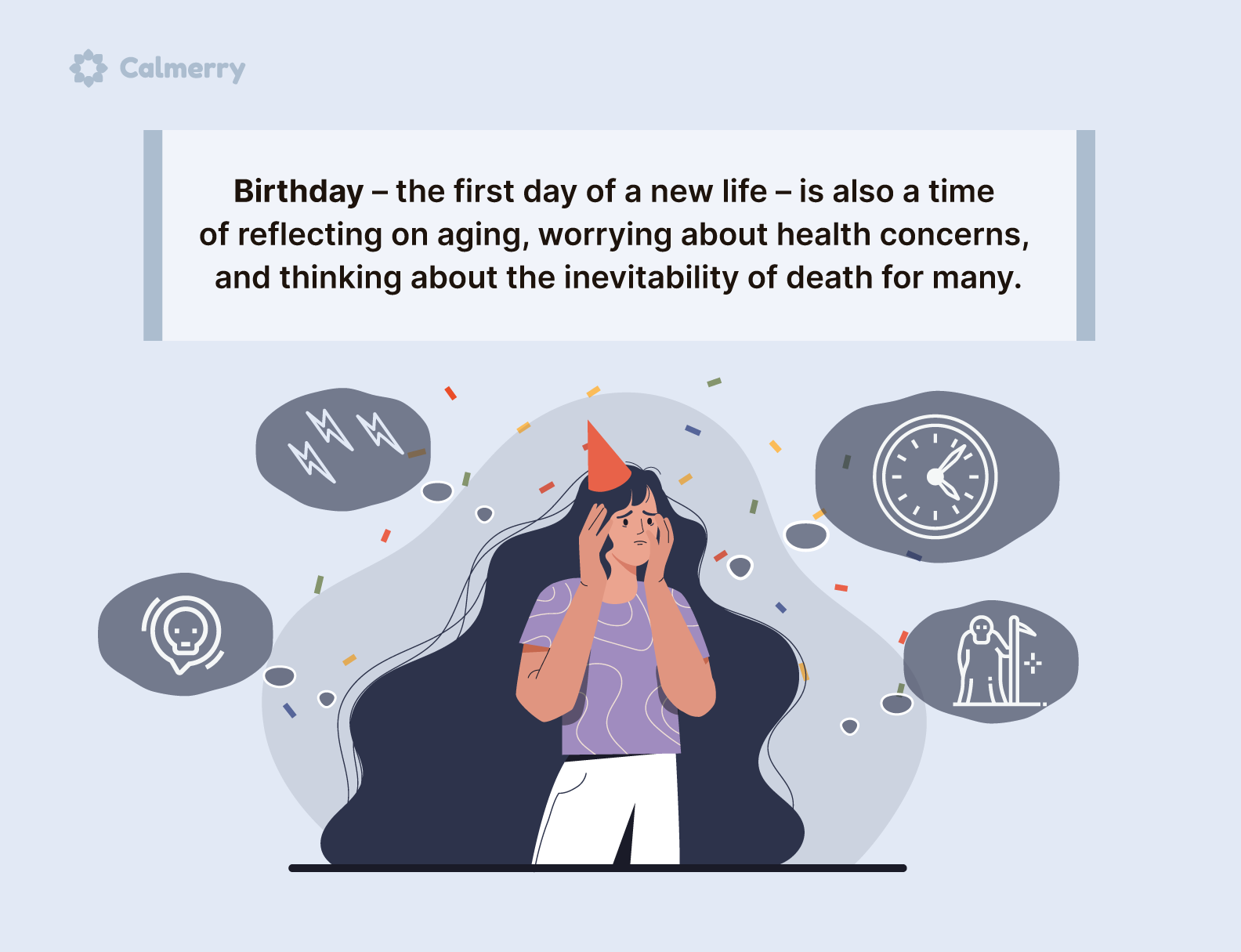
The hard truth: birthdays can be another reminder that we’re not getting any younger. And for some people, facing that thought can cause undue anxiety and stress, especially for those who live with a real anxiety disorder – gerascophobia.
Birthday – the first day of a new life – is also a time of reflecting on aging, worrying about health concerns, and thinking about the inevitability of death for many. This is especially true as we get older, cross the milestones, and start to feel like we’re running out of time.
Traumatic childhood experiences
If someone says, “I’ve always hated my birthdays”, there might be unresolved trauma associated with their special day.
For example, if a person experienced abuse in childhood or neglect on their birthday, they may associate it with painful, negative experiences. Or, maybe something terrible happened to them that day, or they witnessed a traumatic event as a child.
As an adult, they may struggle to cope with those strong emotions and physical reactions that are particularly triggered by the celebration period.
Feeling unsatisfied with life accomplishments
It’s okay to be more reflective on your life before stepping into a new age. But for some, birthday self-reflection can evoke pressure, anxiety, disappointment, and feelings of inadequacy and worthlessness.
This is especially true if you’re comparing your life to others’ highlight reels on social media or facing ongoing challenges, such as health problems or relationship difficulties.
Birthdays can be a reminder of how much time has passed and how little progress you feel you’ve made compared to what you have planned and set as goals. Thus, you may feel like you haven’t accomplished enough, aren’t where you want to be in life, or are not living up to your full potential.

Loss and grief
A birthday can serve as a painful reminder that someone you love is no longer with you. Perhaps, you’ve lost someone right before your day, and you’re going through the early stages of grief, trying to cope with difficult experiences. Or, it can be your first birthday after the loss of a loved one, or it’s the anniversary of a traumatic event.
In any case, the celebration may feel more of a burden than a happy event. And for some people, birthdays can bring up memories of happy times in the past that can’t be replicated. These memories can trigger deep sorrow and make the present seem bleaker.
But remember that your feelings are valid and shouldn’t be suppressed because “it’s your birthday, and you must have fun.” Allow yourself to grieve in whatever way is right for you, and know that there’s no wrong way to feel on this day.
Also, it may be helpful to talk to your loved ones or get support from a therapist to cope with painful emotions.
Major life changes
Maybe you’re going through a tough time in your life and feeling particularly vulnerable. Major life changes could be anything:
- Divorce
- Marriage
- Retiring
- Having children
- Death of a loved one
- Job loss
- Health problems
- Moving out
Whether positive or negative, major changes often correspond with acute periods of stress or can take away the joy that is typically associated with your special day.
The unbearable weight of expectations
The expectations around birthdays can be overwhelming. For example, you can be disappointed by not having expectations met by a party, celebration, or gifts – and that’s okay. Or, there can be an enormous amount of pressure to have a happy birthday and enjoy every minute, even if you don’t feel like it.
Also, striving to meet everyone’s expectations – from friends and family to co-workers and social media followers – leads to increased stress levels. That may turn a joyful life event into a dreadful experience you might like to avoid.
Loneliness
Birthday depression can also be brought on by feelings of loneliness or isolation, especially if you don’t have close friends or family members near you or live with social anxiety. For many, it’s a day that exacerbates the feelings of being invisible or unimportant.
Underlying mental health problems
The symptoms of birthday blues you experience may indicate underlying conditions such as an anxiety disorder or depression. If you’re concerned about the state of your mental well-being, look for the signs described above. If they are impacting your quality of life, it’s advisable to seek help from a healthcare professional.
If you or someone in your family is in crisis, contact your healthcare provider, local mental health authority, or the National Suicide Prevention Lifeline at 1-800-273-TALK (8255).
How to deal with birthday depression
Whatever the reason for feeling down on your big day, all your experiences are valid. Still, there are some things you can do to ease any negative feelings around this period and try to understand where your blues come from.
1. Don’t feel bad for feeling bad
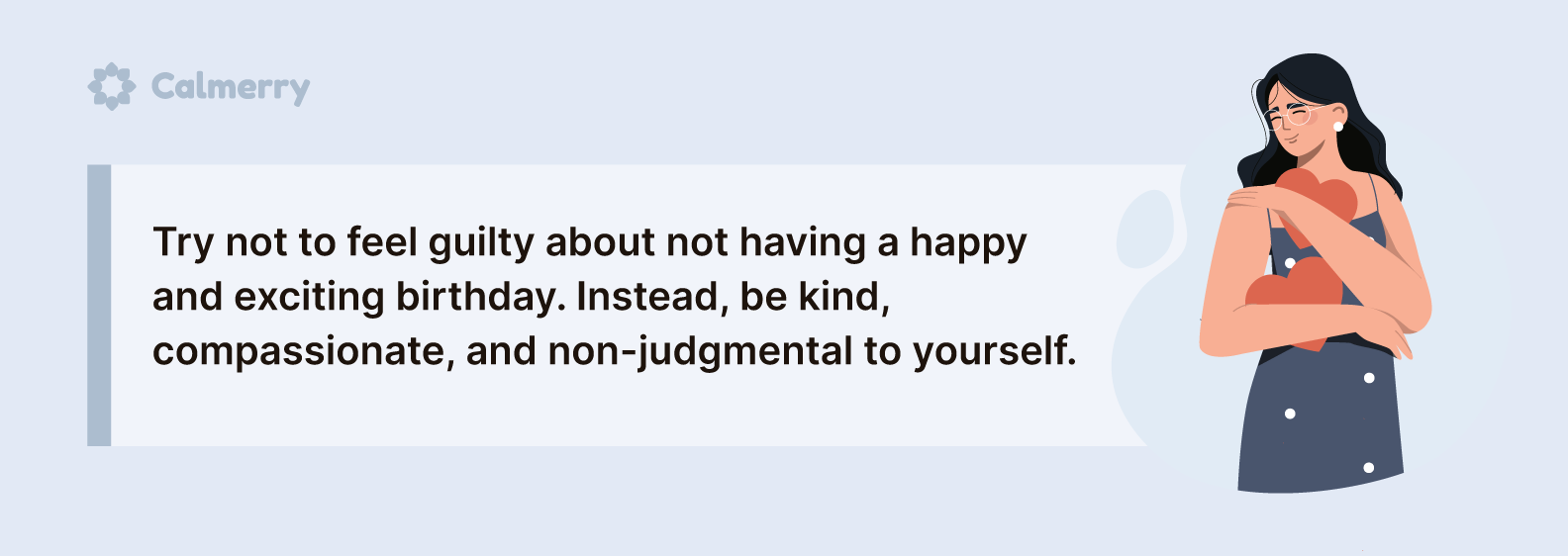
The first step to overcoming birthday depression is to acknowledge that it’s real and common and that it’s happening to you now. You’re not alone in this.
You’ve probably heard the phrase, “It’s your birthday, so you should cheer up and feel happy!” But suppressing your real emotions and feelings can make it even worse.
So try not to experience guilt about not feeling happy and excited on your birthday. Instead, be kind, compassionate, and non-judgmental to yourself. If you are upset, sad, depressed, or grieving – accept it. Allow yourself to embrace all your emotions, even if they are negative, confusing, and overpowering.
Recognizing and accepting them is an important step in getting to the deeper meaning behind and managing them.
2. Avoid comparing yourself to others
One trap you may fall into when you’re feeling birthday depression is comparing yourself to others.
Maybe you see all your friends posting about their amazing celebrations on social media and feel left out or like you’re not good enough. Or, maybe you compare your life now to where you thought you would be at this age and feel disappointed.
Comparing yourself to others is by no means a productive way to deal with your feelings. Instead, try focusing on accepting yourself for who you are and where you are in life. Give yourself credit for how far you’ve come, and be proud of who you are today!
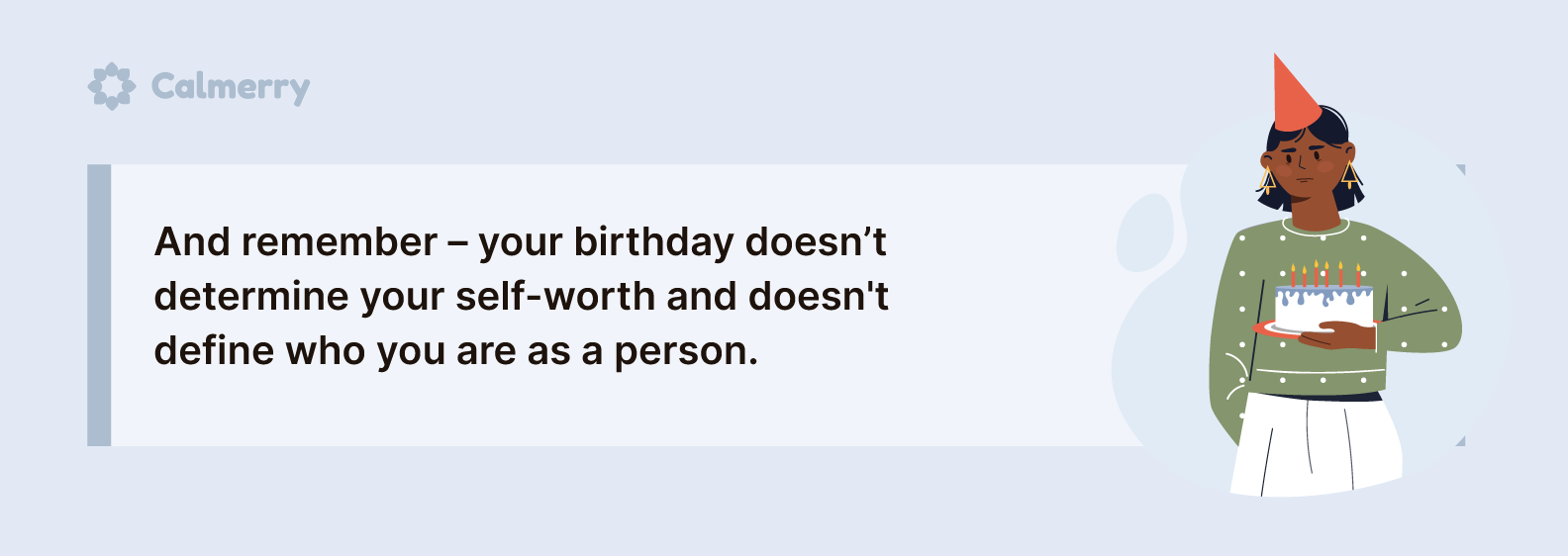
3. Beat the imposed expectations and celebrate however you feel comfortable
Birthday depression is often the result of unrealistic expectations. Society, friends, and family can put a lot of pressure on you to have the “perfect” birthday. And if things don’t go as planned by you or expected by others, you start feeling the vibe of disappointment, which, in turn, reinforces the hamster wheel of self-blame, sadness, and worthlessness.
Remember that you don’t have to do anything you don’t want to do. All in all, this day is all about you, and you truly own your birthday. So take charge: you can say no to plans that don’t interest you and do something that fosters your physical and mental well-being instead.
If there are certain activities or situations that you know will trigger your low mood and anxiety, try to avoid them. If it’s not possible, come up with a plan for how to deal with them beforehand or consider rescheduling.
If you have no desire to plan anything at all to mark your birthday, you’re always free to do nothing! Only you can decide how to make this day best for you.
4. Treat yourself!
Actually, there’s always something to celebrate on your special day – and the core reason is you! If you’re feeling particularly down on your birthday, it’s important to be kind to yourself and make a conscious effort to do something that will make you feel better.
It can be any self-care activity, such as:
- Going out with friends
- Staying in with a good book
- Taking yourself out to dinner
- Watching your favorite movie
- Trying yoga or any other physical activity you like
- Performing acts of kindness, such as donating to an organization
- Going on a journey
- Practising gratitude and mindfulness without distractions
- Taking a class
- Buying yourself a present
- Booking a session with a therapist
Just because you’re not in the mood to celebrate doesn’t mean you can’t still do something special for yourself. Anyway, there’s more to this day than candles and cake, right?
5. Try a special birthday journaling
Birthdays are a time to reflect on the year gone by, and it’s not always easy. We tend to turn self-reflection into rumination and other unproductive thinking patterns by focusing on “failures” or upsetting life events.
This leads to diving deeper into unpleasant feelings, self-doubt, and overwhelming emotions.
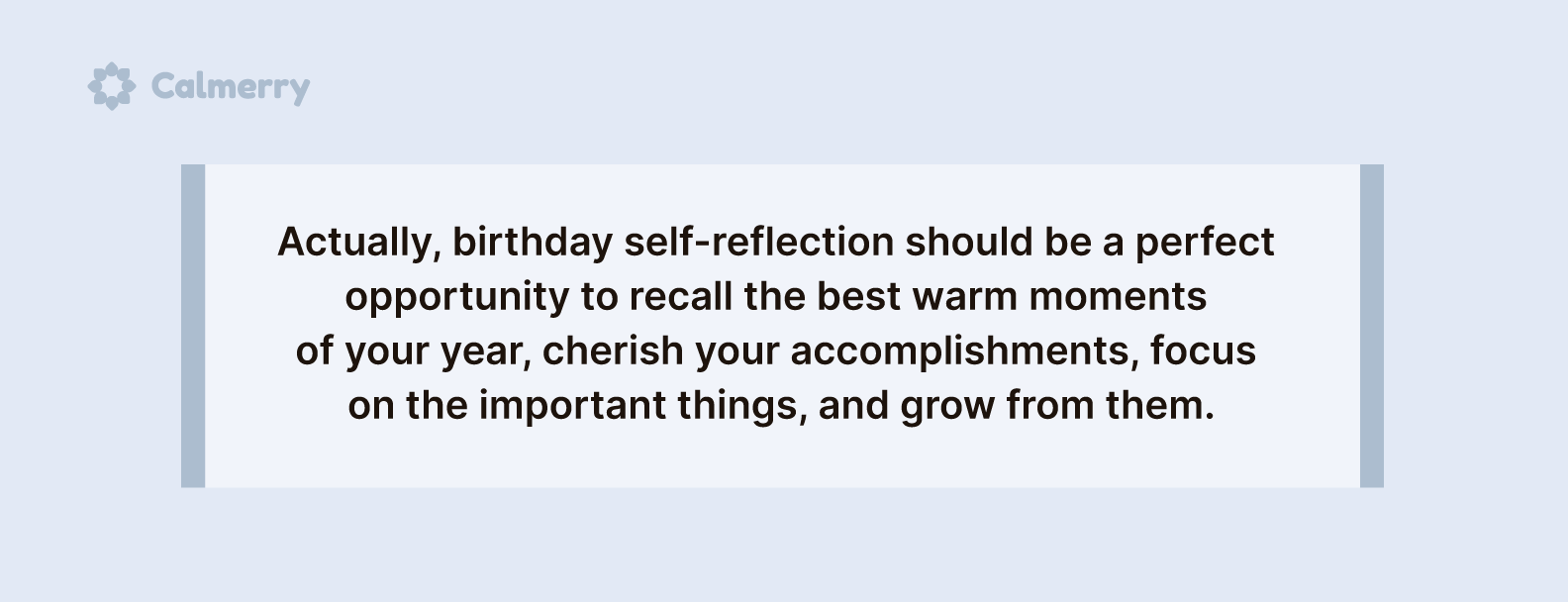
Birthday journaling can help you put your life into perspective and see how far you’ve come. Moreover, it’s a good exercise for figuring out what specifically is making you sad on your big day.
So take some time to think about all the things that have happened – both good and bad. Write down your thoughts and feelings about your birthday and the year to come.
Here are some nice ideas you can use to keep a more organized outline of your journaling and make it a fun but mentally and spiritually beneficial activity. And it’s even more convenient to do by using free journaling and mood-tracking tools on Calmerry.
Name the best things that happened to you
Think about the best things that happened to you during the past year.
It could be anything: from big events (you got a job of your dream, found your supportive soulmates, finished a crucial piece of artwork) to smaller ones (you gained a new healthy habit or gave up a bad one, you traveled to a wonderful place, you got a small but memorable gift, you heard a really nice joke, you got a warm smile from someone you like) – anything that has contributed to your happiness matters.
There’s more to life than only major changes or embarrassing moments.
So write down and end the following statement with as many points as you can ever recall:
The best things that happened to me last year were…
Describe the biggest challenges
Then, let’s impartially observe the biggest challenges that brought up complex emotions and feelings in you. Try to find compassion for yourself when thinking about them. Add some thoughts about how these challenges made you feel, what you learned, and what you can do to grow from them.
- This year, I faced these challenges…
- When I was going through this, I felt… and….
- From this challenge, I learned that…
As a helpful and enjoyable activity, you can develop the last point into a separate personal list of the biggest life lessons you’ve learned in your 20s, 30s, 40s, and so on. Feel free to update this list every year.
Write what you hope will happen by your next birthday
There’s a statement that will help you cover the aspect of the future: “I hope to…by next year.”
This exercise isn’t about setting life-changing goals or resolutions only. It presupposes inner changes as well.
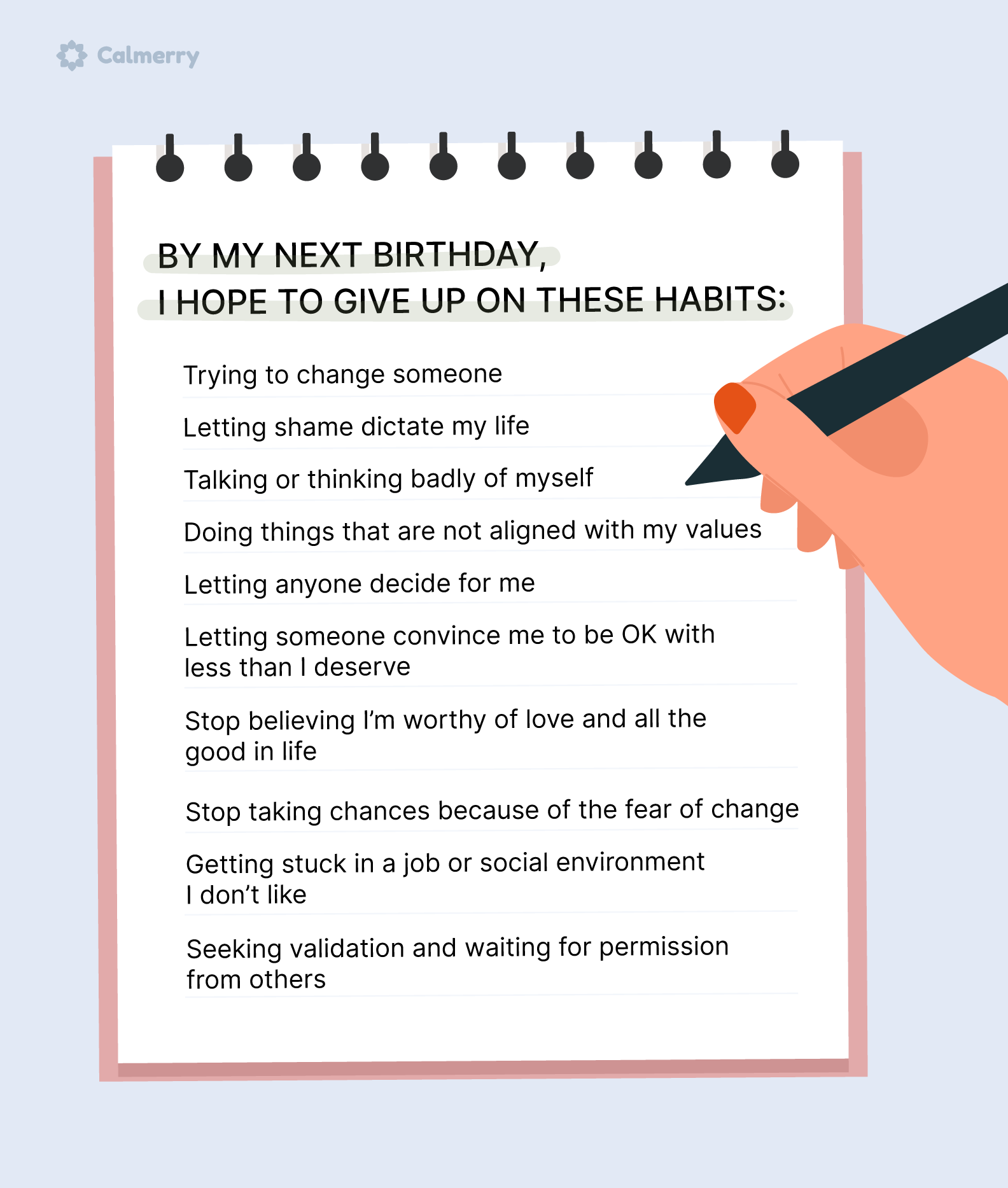
6. Share how you feel with someone who understands
Birthday parties aren’t necessary — but sharing how you feel with someone you trust and spending quality time with loved ones can help alleviate birthday blues.
So, reach out to your trusted friends or close family members. Let them know how you’re feeling and see if they can do anything to make your day better.
7. Talk to a mental health professional
You may also want to consider talking to a therapist who can support you through this tough period.
A mental health professional on Calmerry can provide more insights into your experiences and help you manage any underlying mental health problems that might be causing or contributing to your birthday blues.
Together, you can process your complex emotions and work on healthy coping strategies.
We can match you with your therapist within 1 hour.
On a last note, before your new year
This one day doesn’t define your entire life. But you definitely deserve to be supported, loved, and happy today and all year round.
Happy and calm birthday to you from all of us at Calmerry!💙
online therapy
live video session



